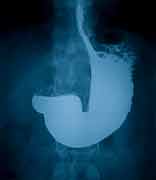- Could Your Grocery Store Meat Be Causing Recurring UTIs?
- Are You Making This Expensive Thermostat Error This Winter?
- Recognizing the Signs of Hypothyroidism
- 10 Strategies to Overcome Insomnia
- Could Artificial Sweeteners Be Aging the Brain Faster?
- Techniques for Soothing Your Nervous System
- Does the Water in Your House Smell Funny? Here’s Why
- Can a Daily Dose of Apple Cider Vinegar Actually Aid Weight Loss?
- 6 Health Beverages That Can Actually Spike Your Blood Sugar
- Treatment Options for Social Anxiety Disorder
Taller People May Have Lower Risk of Esophageal Cancer: Study


Being tall may reduce the risk of esophageal cancer and its precursor, Barrett’s esophagus, a new study suggests.
Researchers analyzed data from international studies that included 1,000 esophageal cancer patients, 2,000 Barrett’s esophagus patients and thousands of people without either condition.
Men shorter than 5 feet 7 inches and women shorter than 5 feet 2 were about twice as likely to have Barrett’s esophagus or esophageal cancer than men who were taller than 6 feet and women who were taller than 5 feet 5.
The association between height and disease risk was not affected by age, education, smoking, body fat, abdominal obesity or symptoms of gastroesophageal reflux disease (GERD), according to the study published recently in the journal Clinical Gastroenterology and Hepatology.
“Interestingly, the relationship between height and esophageal cancer is opposite from many other cancers — including colorectal, prostate and breast — where greater height is associated with an increased risk,” study author Aaron Thrift, of the public health sciences division at Fred Hutchinson Cancer Research Center in Seattle, said in a journal news release.
There is no obvious explanation for the link between height and the risk of esophageal cancer and Barrett’s esophagus, and further research is necessary to learn more about the connection, the researchers said. While the study found an association, it did not prove a cause-and-effect link.
“The identification of risk factors, such as height, will allow us to create more sophisticated and accurate methods to quantify patient risk, which will hopefully be used in the future to decide who should undergo endoscopic screening for these conditions,” Thrift said.
Nearly all cases of esophageal cancer arise from Barrett’s esophagus. Incidence of esophageal cancer in the United States rose eightfold from 1973 to 2008.
More information
The U.S. National Cancer Institute has more about esophageal cancer.
Source: HealthDay
Copyright © 2026 HealthDay. All rights reserved.










